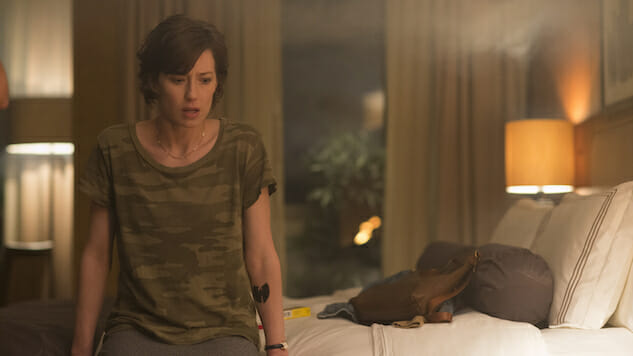The Leftovers: Perfect Strangers
(Episode 3.04)
Ben King/HBO
When the sun is wrapped up [in darkness]
And when the stars fall, dispersing
And when the mountains are removed
And when full-term she-camels are neglected
And when the wild beasts are gathered
And when the seas are filled with flame
And when the souls are paired
And when the girl [who was] buried alive is asked
For what sin she was killed
And when the pages are made public
And when the sky is stripped away
And when Hellfire is set ablaze
And when Paradise is brought near,
A soul will [then] know what it has brought [with it]. —Surah 81:1-14
The sign with which “Evie” (Jasmin Savoy Brown) gains Kevin’s (Justin Theroux) attention refers to this Surah on the end of the world, and though its measure of souls suggests the weight we all carry, the woman “buried alive” in “G’Day Melbourne” is none other than Nora Durst (Carrie Coon). The DSD fraud investigator’s off-book sting brings her to a warehouse on the outskirts of the city, where she agrees to be sealed in a shipping crate: The “event chamber of the device” by which Mark Linn-Baker and 119 others “went through,” as the doctor examining her explains, “requires an intense period of confinement,” and the wooden box is a test of her strength. As she reclines on a bed of packing peanuts, the episode’s musical through line, a-ha’s “Take On Me,” blares from a few forthright horns, and The Leftovers finds the last remaining link between Nora and Kevin: their desperate need to escape.
“G’Day Melbourne” thus contains two distinct arcs, fused by the desire that pries the couple apart. In Nora’s enclosure, as in Kevin’s search, the characters become, as it were, perfect strangers—one turns inward, one outward, and yet they share the same basic impulse, which is to imagine that their pain has a cure. Much of the hour, from their separation at airport security and their fast, detached fuck—the latter cast in grim, greenish light, as if submerged underwater—to their climactic argument, is built from the knowledge, as Ray Lamontagne has it, that “This Love Is Over”; as Nora notes aboard their flight, crafting that overemphatic excuse, “We’re in a toxic, co-dependent relationship, and we’ve come to realize we’re better off apart than together.” The Leftovers, of course, refuses to leave it at that, and “G’Day Melbourne” sees two distinct threads become one: A portrait of souls that know what they’ve brought with them, holding different baggage of equal weight.
-

-

-

-

-

-

-

-

-

-

-

-

-

-

-

-

-

-

-

-

-

-

-

-

-

-

-

-

-

-

-

-

-

-

-

-

-

-

-

-








































